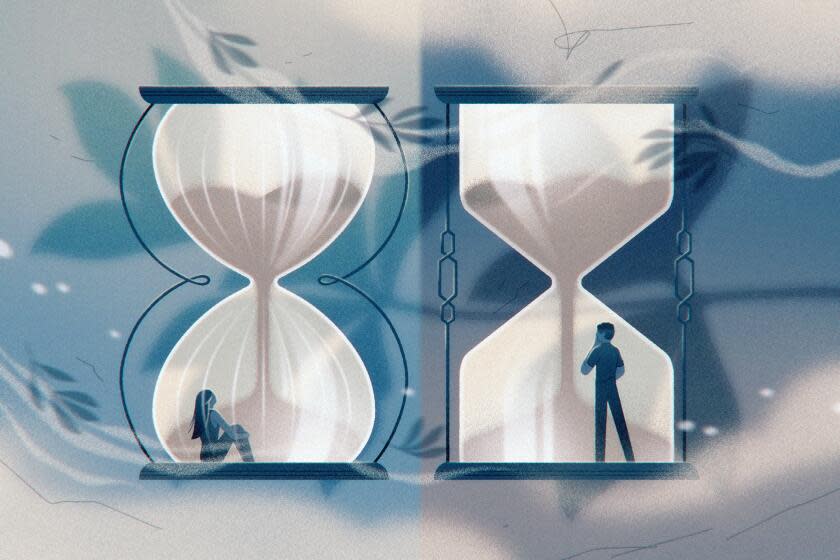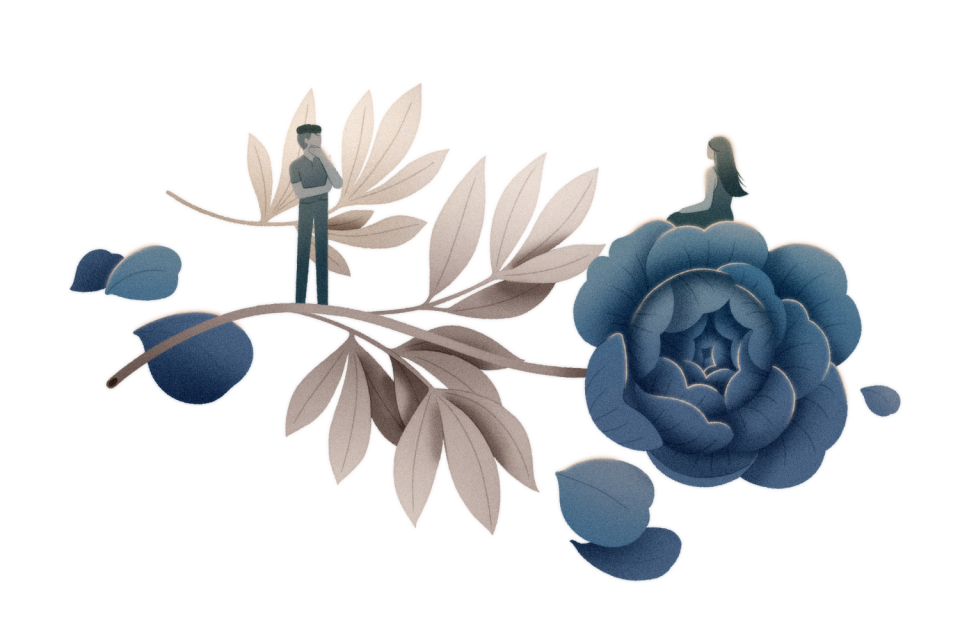Want to live to 100? That may depend on your sex

Do you want to live to 100? The path to becoming a healthy centenarian — as opposed to just a centenarian — is surprisingly different for those born as women and men, says social researcher and author Maddy Dychtwald. And it’s never too early to start on the journey, even when you're young and spry. (We’re talking to you, zoomers.)
As co-founder of Age Wave, a think tank focusing on longevity and aging, Dychtwald has been researching these topics for nearly 40 years. In her new book, “Ageless Aging: A Woman’s Guide to Increasing Healthspan, Brainspan, and Lifespan,” Dychtwald addresses the most recent aging picture for women and identifies a holistic plan for longevity. It weaves together science and medicine, psychology and spirituality, as well as financial advice in a research-based guidebook that’s brimming with actionable steps.
“There’s this ripple effect,” Dychtwald says of the lifestyle she recommends for maximizing healthspan — meaning how long you are living in good health, versus how long you are just living. “If you can impact one piece — sleep, nutrition, fitness, having a sense of purpose and connection — it begins to affect the others.” This interview has been edited for length and clarity.
How is longevity different for women than men?
Women have actually won the longevity lottery. We live, on average in the United States, six years longer than men. So that’s incredibly positive. But there is a dark side to this. And that is: We women, on average, spend the last 12 to 14 years in declining health. So we are not doing a great job of matching our healthspan to our lifespan. There’s a gendered gap when it comes to healthspan. Why? I don’t know that the answer is clear, even in the minds of scientists. What we do know is that estrogen has protective properties for women. But once their estrogen levels decline, they have more health challenges than men do, as they get older. But it’s something scientists don’t fully understand yet.
If women are 51% of the population, doesn’t it stand to reason that scientists would better understand this by now?
You would think! I think the healthcare system, overall, is well-meaning. But it’s been created by men and as a result, the focus has really been more on men than women. One great example of how women can, as a community, really motivate physicians and researchers and scientists to change is the whole breast cancer issue. Women really spoke out on this and I think, as a result, we’ve seen great strides in research and survival rates and treatment methodologies.
You endured a health challenge, which is one of the things that led to your writing this book. Can you tell us about that?
I’m a big exerciser, it’s how I manage stress. I started getting pain in my hips, to the point where I was limping. I did PT, I got cortisone treatments, I did a variety of things to manage the pain. But it wasn’t solving the problem. Turns out I needed double hip surgery — I was 68, which is young for the condition I had. But they couldn’t see me for months — and I was in excruciating pain. I started researching and learned, from experts in my network, that I needed to get my inflammation levels down. I went on an anti-inflammation diet — I cut out gluten, sugar and dairy — and I found that within six weeks all my pain went away. I thought: "Whoa, there are all these things that we can all do — and they don’t necessarily cost any money — to live better, longer." I started looking at other things I could do. I worked with a psychiatrist at Harvard who taught me about meditation and affirmations. I was doing precovery, essentially — preparing for my surgery in advance. And it made a difference. This book is the distillation of all that, along with the work I've been doing at Age Wave for 40 years.
New research around genetics versus lifestyle choices also informs the book — and your decision to direct it at women. What does the latest research tell us about how to influence our destiny?
We used to just assume that genetics were our destiny. That whatever our genetic package is, that’s kind of the hand that we were dealt. But, in fact, according to the most recent science from Alphabet's Calico Life Sciences and other research, up to 90% of our health and longevity are literally within our control. And I find that an incredibly empowering piece of information. It gives us almost total agency. I didn’t want to just keep that information to myself, I wanted to share it with the world. There are a lot of books out there on longevity, but there aren’t many that really focus in on women and longevity. And obviously, women and men are really different.
During COVID, I was home more than I had been before. There were so many health issues I saw around me and I had an opportunity to really lean into my own sense of purpose. And in order to lean into it in a way that felt good to me, I wanted to [educate] women in their 40s, 50s, 60s and beyond. There are tens of millions of women just in the U.S. in that age group who are starting to feel the aches and pains of getting older, or who are coping with a chronic degenerative disease, or just dealing with the reality of menopause — and who are looking for solutions. I wanted to give women a one-stop resource to clear up the confusion, give them straightforward answers based on science as well as action steps to live better, longer.
You talk about a “holistic recipe” for healthy aging as a woman. What are the ingredients to that — what daily activities, for example, do you incorporate to promote longevity?
There are a lot of books out there on sleep or exercise or nutrition or hormones or having a positive attitude — and by the way, our attitudes toward our own aging can actually add 7½ years to our lifespan — but it’s not just about one thing, it’s all these things working together. They don't exist in silos.
Take finances — there's a gender pay gap. I encourage all women to take charge of their finances. If you don’t have your financial house in order, chances are it will affect your stress levels, your health, your well-being. And you may not even have the financial well-being to pay for your health — and that’s a scary place to be.
If you exercise effectively, it affects your mood and your stress. That helps with sleep, which helps with cognition and so many other things, including managing your finances. It’s cyclical.
Sleep is such a key ingredient. What do you do to manage that?
Sleep is not my superpower. But I learned there were things I could do. One was to really be mindful of my circadian rhythms; controlling our sleep-wake cycles are very important. I learned that what I did during the day was as important, if not more important, than what I did at night to go to sleep. It’s simple — anyone can do it — and it doesn’t cost a penny. Which is: When you get up first thing in the morning, watch the sun rise for 10 minutes. If it’s already up, get sun on your skin for 10 minutes. I do what I call “stacking my habits.” So at the same time, I do some breathing exercises that help me be calm and energetic simultaneously — what a great way to start my day.
One surprising piece of new research that you cite is that exercise has a bigger impact on health, and staving off brain decline later in life, for woman over men.
Yes. We already know that exercising in the morning is the best time of day to exercise, it brings optimal results, and it’s best on an empty stomach. But brand-new research, in a February 2024 study from the Smidt Heart Institute at Cedars-Sinai, says that women don’t have to exercise as hard, or as long, as men to get optimal results. They can get the same health benefits as men from exercise in less time.
For example, women can reduce their risk of death by 18% by doing 140 minutes of moderate aerobic exercise per week, while men need 300 minutes to achieve the same benefit. Women can also achieve the same survival benefit from moderate to vigorous aerobic exercise, like cycling or brisk walking, after 2½ hours per week, while men need about five hours. And when it comes to building muscle mass, strengthening exercises such as weightlifting or core exercises, women can achieve the same positive benefits after one session weekly while men need three sessions.
You talk about two topics that demand the medical community's much closer attention. What are they?
Brain health — no one wants to talk about anything above the neck — and hormones. Hormones affect our cognition, sleep, joints and bones, mood. If you’re not able to sleep at night, it affects your brain health, brainspan and longevity. If your bone density is impacted, you’re more likely to fall, and that could lead to health issues.
And Alzheimer's disease is twice as likely to happen to women than men — people don’t want to talk about it. It’s super scary. But there are things we can do. Dr. Andrea Pfeifer, a neurosurgeon and CEO of AC Immune, a company working on a vaccine for Alzheimer's, says probiotics are what she takes — the gut-brain connection is very real. Many physicians recommend the Mediterranean diet. I do the anti-inflammatory diet.
Another thing is limiting or stopping alcohol. And exercise — every single brain expert I spoke to said that’s the No. 1 thing to protect healthspan and brainspan. The fear of cognitive decline and Alzheimer’s for women is real, but only 4% of women have a genetic connection. And we can take steps to prevent or delay it.
Are there any positive sides of aging for women?
We gain a certain amount of wisdom and experience as we get older. According to recent studies we’ve done at Age Wave, women, as it turns out, from the age of 50 on, they seem to be gaining more confidence in themselves and their lives, whereas men seem to plateau out at around 50. This is all in general, of course. But for women, empowering.

Shelf Help is a new wellness column where we interview researchers, thinkers and writers about their latest books — all with the aim of learning how to live a more complete life. Want to pitch us? Email alyssa.bereznak@latimes.com.
Sign up for our L.A. Times Plants newsletter
At the start of each month, get a roundup of upcoming plant-related activities and events in Southern California, along with links to tips and articles you may have missed.
Sign me up.
This story originally appeared in Los Angeles Times.

